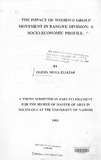| dc.description.abstract | The central thesis of this study is that the pursuit of economic processes in the
rural areas of Kenya through Women's Group Movement causes economic development
and thus elimination of poverty among the rural women and their households.
Membership of and participation in women's groups, and the provision of external cash
/ material assistance to these groups form important channels through which the socioeconomic
impact of the female-oriented self-help development programme on the rural
population can be gauged.
Membership of the .group, as used in the conceptual framework of this thesis, Jo.
refers to, among other things, the strength of member enrollment into the group, his/her
economic standing, and general social status. Participation on the other hand is used to
refer to the various levels of the group members' share in the group activities which are
generally expected to generate group incomes to be saved, invested or earned by the
members. The external assistance to the groups which is another study variable covers
the external aid from sources outside the groups, and it reaches the groups in form of
funds and materials availed to the groups, and is viewed as a necessary supplement to the
group member's voluntary efforts towards group development processes.
The other variables through which the impact of the movement was investigated
included accumulation of capital and productive investment, self-reliance, and inequality.
While accumulation of capital is used to refer to the securing and build-up of productive
capital (like tractors, drought animals) as well as general property such (as houses, land),
productive investment is used in this research to cover funds spent on the means of
raising the levels of production (like in buying fertilizers, seeds or trade merchandise).
By the concept self-reliance in the conceptual framework is meant the degree of the group
members' dependence on their own rather than external resources to contribute to the
growth of their projects and activities, and to meet their group objectives. It also refers
to the female group members' husbands, and their social independence from their men
in conducting their group chores, like making decisions on group affairs. Inequality as
another variable is used as a measure of the extent of differential distribution of group
resources and manual labour between husband and wife. Also covered by the concept
is the discriminative behaviour like differential meting out of disciplinary actions on
various categories of members. Included in this concept is also the acquisition or
increase in the status and/or prestige by the group arising after their recruitment into the
groups.
The role of the men in the movement is also viewed as an interviewing variable
with possible influence on the impact of the movement in rural Kenya.
The research employed data collected from Rangwe Division of the former South
Nyanza District to establish whether the assertion of this thesis is true or not. The main
aim of the study was to determine whether the establishment of women's group
movement in the division is contributing to development both material and non-material.
The indicators of development investigated included productivity, accumulation of capital
and productive investment, rise in status and/or prestige, drop in oppressive labour, and
rise in decision-making.
The study employed multi-stage sampling technique to select respondents. The
individual women's group members were the units of analysis. To collect data interview
schedules (consisting mostly of closed questions and a few unstructured questions), simple
observation, and secondary data were employed. For methods of data analysis the study
made use of chi-square the Gamma test, percentages, means and proportions. The
study argued that the success of the Women's Group Movement is determined by among
other factors, membership (quality of) of the group, participation in group activities,
provision of external assistance, the acquisition of self-reliance and equality by the group
members.
On the question of economic development the study found that the movement has
not brought about tangible economic development due to its inability to stimulate rapid
accumulation of capital and productive investment. It has caused some growth besides
supplementing the self-subsistence of the members and their families. The movement
therefore does not serve the rural women in Rangwe as a tool for the eradication of
poverty among them.
The study established that participation in women's groups contributes to the
development of intersex and intra-sex equitable distribution of incomes and labour in the
rural areas, and thus serves as a viable tool for reducing economic inequality and
exploitation in the countryside.
The study further determined that membership of the women's groups brings
about a reduction in the social oppression of women in the rural areas and therefore
serves as a tool for the eradication of non-material indicators of poverty. That is, the
movement is promoting the growth of social equality in the rural areas, and should not
continue to involve only a minority of rural women as is the case today.
The study also found that the provision of external financial/material assistance
to women's groups brings about the development of self-reliance by the women's groups,
and the achievement of economic independence by the women in these groups from their
husbands. Its provision should therefore be considered as a necessary component in the
promotion of the programme. .
The study generally finds women's group movement to be contributing to the
elimination of socio-economic discrimination between the sexes and among the women
but finds it lacking as a programme for rapid economic development and elimination of
material indicators of poverty among the rural women.
In order that the application of the Women's Group Movement may imprint
tangible and positive impact on the economic development of the rural women the study
concludes that there will have to be a critical reconsideration and streamlining of a
number of its activities. | en |

